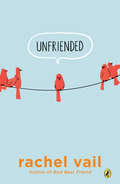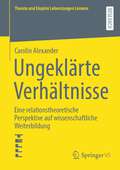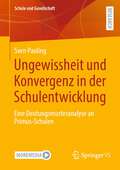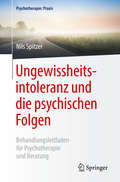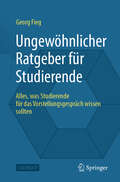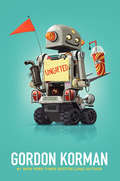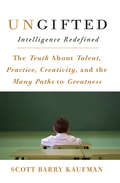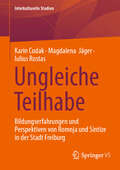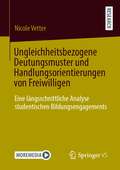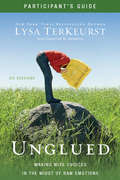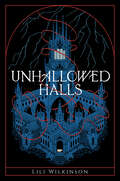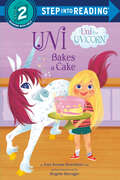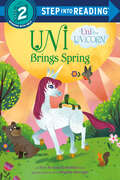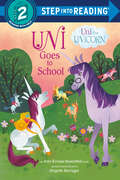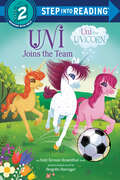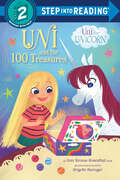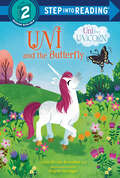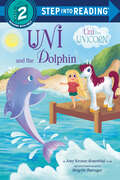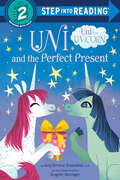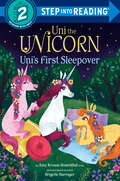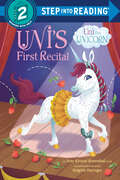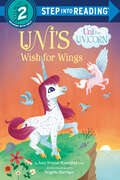- Table View
- List View
Unfriended
by Rachel VailIn middle school, nothing is more important than friendship.When Truly is invited to sit at the Popular Table with the group she has dreamed of joining, she can hardly believe her luck. Everyone seems so nice, so kind to one another. But all is not as it seems with her new friends, and soon she's caught in a maelstrom of lies, misunderstandings, accusations and counter-accusations, all happening very publicly in the relentless, hyperconnected social media world from which there is no escape.Six eighth-graders, four girls and two boys, struggle to understand and process their fractured glimples into one another's lives as they find new ways to disconnect, but also to connect, in Rachel Vail's richest and most searching book.
Unfriended
by Rachel VailIn middle school, nothing is more important than friendship.When Truly is invited to sit at the Popular Table with the group she has dreamed of joining, she can hardly believe her luck. Everyone seems so nice, so kind to one another. But all is not as it seems with her new friends, and soon she's caught in a maelstrom of lies, misunderstandings, accusations and counter-accusations, all happening very publicly in the relentless, hyperconnected social media world from which there is no escape.Six eighth-graders, four girls and two boys, struggle to understand and process their fractured glimples into one another's lives as they find new ways to disconnect, but also to connect, in Rachel Vail's richest and most searching book.
Ungeklärte Verhältnisse: Eine relationstheoretische Perspektive auf wissenschaftliche Weiterbildung (Theorie und Empirie Lebenslangen Lernens)
by Carolin AlexanderDas Erkenntnisinteresse der Untersuchung zielt auf einen Beitrag zur Klärung der "besonderen" Positionierung wissenschaftlicher Weiterbildung. Diese wird im wissenschaftlichen Diskurs innerhalb unterschiedlicher Zugänge (auf bspw. wissens-, wissenschaftstheoretischer oder institutioneller Ebene) als Verhältnis zum Ausdruck gebracht und mit entsprechenden Relationsbegriffen wie bspw. Transformation, Dialog, Verschränkung oder Relationierung belegt. Bereits auf der Ebene der Begriffsverwendung wird die Verhältnishaftigkeit wissenschaftlicher Weitebildung sichtbar. Obgleich mit der Semantik ein relationales Denken zum Ausdruck gebracht wird, bleibt eine explizite Thematisierung eines solchen Relationsdenkens bislang aus. Somit bleiben die jeweiligen Hintergrundannahmen, vor denen die Verhältniszuschreibungen vorgenommen werden, ungeklärt. Erst die konzeptuelle Durchmusterung der relationstheoretisch bislang ungeklärten Verhältnisse wissenschaftlicher Weiterbildung ermöglicht es, für die Theoriebildung wissenschaftlicher Weiterbildung weiterführende Beiträge zu ihrer besonderen Positionierung im engeren und zur Frage der Gegenstandskonstitution wissenschaftlicher Weiterbildung im weiteren Sinne einen Beitrag zu leisten.
Ungewissheit und Konvergenz in der Schulentwicklung: Eine Deutungsmusteranalyse an Primus-Schulen (Schule und Gesellschaft #70)
by Sven PaulingWas bedeutet es für Lehrkräfte, eine für sie neue pädagogische Praxis zu vollziehen, die sie zugleich im Rahmen von Schulentwicklung erst entwickeln müssen? Mit dieser forschungsleitenden Frage werden im vorliegenden Band professionelle Deutungsmuster von Lehrkräften im Schulversuch PRIMUS herausgearbeitet. Der Arbeit liegt eine reformulierte struktur- und schulkulturtheoretische Analyseeinstellung zugrunde, die den bisherigen theoretischen Rahmen um das professionelle organisationale Handeln erweitert. Die theoretische Perspektive leitet eine empirische Interviewstudie mit qualitativ-rekonstruktiven Auswertungsmethoden an, die zunächst zu den beiden Handlungsfeldern des pädagogischen und des Schulentwicklungshandelns jeweils drei zentrale Bezugsprobleme und dazugehörige Deutungsmuster von Lehrkräften erarbeitet. In einem zweiten Schritt werden die Befunde hinsichtlich der beiden Phänomene Ungewissheit und Konvergenz interpretiert. Im Kern verweist die Studie auf die Bearbeitungsmöglichkeit von Ungewissheit in der kollegialen Gemeinschaft auch über deren divergente Deutungsmuster hinweg.
Ungewissheitsintoleranz und die psychischen Folgen: Behandlungsleitfaden für Psychotherapie und Beratung (Psychotherapie: Praxis)
by Nils SpitzerDieses Buch führt Psychotherapeuten und Berater in relevante Facetten von Ungewissheitsintoleranz ein, verdeutlicht ihre transdiagnostische Rolle bei psychischen Störungen und stellt detailliert therapeutische Ansatzpunkte zu ihrer Veränderung vor. Der Autor zeigt, wie Therapeuten, Berater und Psychiater ihre Patienten und Klienten dabei unterstützen können, Ungewissheit besser auszuhalten. Denn ausgeprägte Ungewissheitstoleranz ist möglicherweise eine Schlüsselkompetenz in unserer Zeit beständigen Wandels und steigender Unsicherheit.Die psychotherapeutische Forschung beschäftigt sich unter dem Begriff Intoleranz gegenüber Ungewissheit/Intolerance of Uncertainty (IU) mit den negativen Folgen für Menschen, die Ungewissheit nur in kleiner Dosis ertragen können. Die Liste der psychischen Diagnosen, mit denen IU in Zusammenhang gebracht wird, ist lang: Generalisierte Angststörung, Zwangsstörung, Soziale Phobie, andere Angststörungen, Autismus, Depression und der ungewisse Verlauf chronischer Krankheiten. Aus dem Inhalt: Ungewissheit – Geringe Toleranz gegenüber dem Ungewissen – Mögliche Ursachen – Psychische Folgen – Therapieziele – Therapeutische Beziehung – Exploration – Interventionen – Ideen zu einem alternativen Sinn für das Ungewisse. Der Autor: Nils Spitzer ist Psychologischer Psychotherapeut in freier Praxis, Dozent, Autor zahlreicher Artikel und mehrerer Fachbücher sowie Mitherausgeber der Zeitschrift für Rational-Emotive & Kognitive Verhaltenstherapie.
Ungewöhnlicher Ratgeber für Studierende: Alles, was Studierende für das Vorstellungsgespräch wissen sollten
by Georg FiegDieses Buch bietet ein neues und innovatives Konzept für die optimale Studiengestaltung. Für viele Studierende mag es überraschend sein, aber es stimmt: Das Hauptanliegen des Studiums liegt in der … Zukunft und beinhaltet das Vorstellungsgespräch. Die eigene Zukunft ereignet sich nicht, sie wird aktiv von jedem mitgestaltet. Hierfür bekommen anvisierte Zielgruppen praxiserprobte Tipps, Tricks und Handlungsempfehlungen, die den Forderungen der Praxis folgen: Pragmatisch, einfach und vor allem nutzbar. Sie ermöglichen, unzählige Entscheidungen optimal zu treffen, die eigene Zukunft aktiv mitzugestalten und verfolgen erfolgreich das Prinzip „früher an Später denken&“ mit einem ganzheitlichen, klar definierten Leitfaden.Die Hauptzielgruppe sind Studierende, die mit dem Ratgeber praxisorientierte und verständliche Vorschläge für die Gestaltung ihres Studiums erhalten. Eine weitere Zielgruppe sind Abiturienten, denen allgemeingültige Regeln und Hilfen für den Übergang vom Pausenhof zum Hochschul-Campus verständlich vermittelt werden. Für Hochschulabsolventen wird ein Konzept der glaubwürdigen Selbstdarstellung dargelegt, um im Vorstellungsgespräch eigene Alleinstellungsmerkmale geschickt hervorzuheben. Schließlich richtet sich der Ratgeber an zentrale Beratungseinrichtungen an Hochschulen.
Ungifted
by Gordon Korman<P>Donovan, whose real gift is getting into trouble, finds himself at an academy for gifted students! Donovan is definitely skilled... at getting into trouble. And when one of his thoughtless pranks accidentally destroys the school gym during the Big Game, with the superintendent watching, he knows he's in for it. Suspension at best, maybe expulsion. Either way, a lawsuit and paying for damages. <P>But through a strange chain of events, his name gets put on the list for the local school for gifted students: the Academy for Scholastic Distinction. Donovan knows he's not a genius, but he can't miss this chance to escape. Now, he has to figure out a way to stay at ASD -- and fit in with the kids there. And who knows, maybe his real gift will come to light. . . <P>A new story from the master of middle-grade and YA humour Gordon Korman, Ungifted is a funny exploration of the special (and often surprising) talents that make each of us gifted in our own way.
Ungifted: Intelligence Redefined
by Scott Barry KaufmanChild prodigies. Gifted and Talented Programs. Perfect 2400s on the SAT. Sometimes it feels like the world is conspiring to make the rest of us feel inadequate. Those children tapped as possessing special abilities will go on to achieve great things, while the rest of us have little chance of realizing our dreams. Right?In Ungifted, cognitive psychologist Scott Barry Kaufman-who was relegated to special education as a child-sets out to show that the way we interpret traditional metrics of intelligence is misguided. Kaufman explores the latest research in genetics and neuroscience, as well as evolutionary, developmental, social, positive, and cognitive psychology, to challenge the conventional wisdom about the childhood predictors of adult success. He reveals that there are many paths to greatness, and argues for a more holistic approach to achievement that takes into account each young person's personal goals, individual psychology, and developmental trajectory. In so doing, he increases our appreciation for the intelligence and diverse strengths of prodigies, savants, and late bloomers, as well as those with dyslexia, autism, schizophrenia, and ADHD.Combining original research, anecdotes, and a singular compassion, Ungifted proves that anyone-even those without readily observable gifts at any single moment in time-can become great.
Ungleiche Teilhabe: Bildungserfahrungen und Perspektiven von Romnja und Sintize in der Stadt Freiburg (Interkulturelle Studien)
by Karin Cudak Magdalena Jäger Iulius RostasDas Buch greift die Saunders&’sche Idee der Arrival Cities (Saunders 2012) auf, die Stadtgesellschaften und Städte wie Freiburg heute intensiv prägt. Sie basiert darauf, Menschen in Städten Möglichkeiten zum Ankommen zu bieten. Die Idee geht dabei weit über konzeptionelle Überlegungen an der Oberfläche der Städte i.S. eines Stadtmarketings oder eines ‚inklusiven Anstrichs&‘ der Stadt als diversitätsgeprägte Ankunftsstadt hinaus. Vielmehr geht es darum, Städte zu Lebensorten und -räumen für alle Bürger*innen zu machen – angefangen bei der Planung, über die Gestaltung bis hin zum urbanen Zusammenleben in allen Lebensbereichen. Dies betrifft die Schaffung von zugänglichem und bedarfsgerechtem Wohnraum, gleichberechtigtem Zugang zu gesundheitlicher Versorgung sowie zu inklusiver Bildung und Arbeit. Das Buch bietet vor diesem Hintergrund fundierte Einblicke in die Teilhabesituationen, -ansprüche und -perspektiven von Romnja und Sintize mit Fokus auf ihre Bildungsteilhabe. Untersucht werden Bildungserfahrungen und Perspektiven von Frauen aus der Minderheit der Sinti und Roma in Freiburg im Breisgau, Deutschland. Dabei liegt ein besonderer Schwerpunkt auf der Situation von Frauen, die während ihrer (frühen) Kindheit oder als Jugendliche mit ihrer Familie nach Freiburg geflüchtet sind. Auf Basis von qualitativen Interviewdaten werden in der Studie Bildungshindernisse, Unterstützungssysteme und Möglichkeiten zur Verbesserung der Teilhabe erforscht. Zu den wichtigsten Ergebnissen zählt die Analyse von strukturellen Barrieren, vielgestaltigen Diskriminierungserfahrungen sowie Unterstützungssystemen und Ressourcen, auf welche die Frauen in ihren Bildungsverläufen zurückgreifen. Daraus werden Handlungsbedarfe für eine teilhabe-orientierte und inklusive Stadtplanung und Organisationsentwicklung ermittelt. Zielgruppen: Studierende und Lehrende (u.a. Soziale Arbeit, Sozialpädagogik, Pädagogik und Erziehungswissenschaft, Soziologie) Pädagogische Fachkräfte (u.a. der Schulsozialarbeit, Soziale Arbeit, Beratung, Schule und Bildung) Verwaltungsmitarbeiter*innen der Kommunen, Kreise und der Bildung Politische und zivilgesellschaftliche Akteur*innen
Ungleichheitsbezogene Deutungsmuster und Handlungsorientierungen von Freiwilligen: Eine längsschnittliche Analyse studentischen Bildungsengagements
by Nicole VetterDas Buch beleuchtet das in Deutschland noch relativ junge Feld zivilgesellschaftlichen Bildungsengagements aus ungleichheitssoziologischer Perspektive anhand eines konkreten Falls: Ein studentischer Verein, der ‚motivierten‘ und gleichzeitig ‚sozial benachteiligten‘ Schüler*innen der Sekundarstufe I kostenfreie Nachhilfe in den Kernfächern an Schulen in einem großstädtischen Raum ermöglicht. Die Studie rekonstruiert, welche Wahrnehmungen sozialer Ungleichheit engagierte Studierende bezüglich ihres auf den Abbau von (Bildungs-)Benachteiligung gerichteten Handelns besitzen und wie diese die ehrenamtliche Handlungsorientierung strukturieren.
Unglued Participant's Guide: Making Wise Choices in the Midst of Raw Emotions
by Lysa TerkeurstUse this participant’s guide in conjunction with the Unglued DVD to dig deeper into learning how to acknowledge, understand, and manage raw emotions that are commonplace to the average woman. According to author and speaker Lysa TerKeurst, each time we feel a raw emotion coming to the surface it’s an opportunity to either fall back into patterns that make us wallow in guilt or choose more wisely and make progress. Let’s choose today to progress! Session titles include: Why A I So Emotional? What’s Really Going On? Roadblocks Sucker Punches Putting on My Big Girl Pants I’m the Boss of My Emotions
Ungrading: Why Rating Students Undermines Learning (and What To Do Instead) (Teaching and Learning in Higher Education Series)
by Alfie Kohn Susan D. BlumThe moment is right for critical reflection on what has been assumed to be a core part of schooling. In Ungrading, fifteen educators write about their diverse experiences going gradeless. Some contributors are new to the practice and some have been engaging in it for decades. Some are in humanities and social sciences, some in STEM fields. Some are in higher education, but some are the K–12 pioneers who led the way. <p><p>Based on rigorous and replicated research, this is the first book to show why and how faculty who wish to focus on learning, rather than sorting or judging, might proceed. It includes honest reflection on what makes ungrading challenging, and testimonials about what makes it transformative.
Unhallowed Halls
by Lili WilkinsonDARK ACADEMIA...WITH DEMONS.A teen girl travels to an exclusive boarding school after a deadly incident at her old school, but the wood-paneled halls of Agathion are built over centuries of secrets—including an ancient society which may have ties to demonic magic—in this dark academia fantasy perfect for fans of Curious Tides.Page Whittaker has always been an outcast. And after the deadly incident that destroyed her single friendship at her old school, she needs a fresh start. Which is why when she receives a scholarship offer from Agathion College, an elite boarding school folded deep within the moors of Scotland, she doesn&’t even consider turning it down.Agathion is everything Page has ever wanted: a safe haven full of dusty books, steaming cups of tea and rigorous intellectual debate. And for the first time in her life, Page has even managed to become part of a close group of friends. Cyrus, Ren, Gideon, Lacey and Oak help her feel at home in Agathion's halls--the only problem is, they're all keeping secrets from her. Page doesn't know it yet, but her perfect new school has dark roots--roots that stretch back to its crooked foundation, and an ancient clandestine society with rumored ties to demonic magic. Soon, Page will be forced to learn that not everyone at Agathion is who they say they are. Least of all, her friends.Agathion claims to teach its students history…but some histories should stay buried.
Unholy Science
by Lynda Williams Pepe LarrazWhen the U.S. develops intelligence showing that Iran is in the final stages of assembling a nuclear bomb, the President orders Breanna Stockard and the Whiplash team to destroy it before the renegade nation can destabilize the shaky Middle East. Left with no other choice, Stockard sends young Air Force ace Turk Mako behind enemy lines. His orders: pilot a squadron of high-tech nano-UAVs from inside Iran to destroy the weapon and its assembly bunker.
Uni Bakes a Cake (Step into Reading)
by Amy Krouse RosenthalUni the Unicorn for early readers! This Step 2 Step into Reading book features Uni's best girl friend and a cake baking contest!Uni slides down the rainbow to see the little girl--the best friend a unicorn could have. It's baking time! The little girl is worried that her cake won't be as pretty and tasty as the other children's. Will Uni use unicorn magic to help? Will the little girl win the blue ribbon--or will she find that winning isn't everything, and the most important thing is having fun with friends? Find out in this all new Step 2 reader.Uni the unicorn is a charming and relatable character! Fans of the picture books, as well as new Uni fans, will be excited to join this bighearted unicorn on an amazing journey. Look for all the Uni stories, including early readers Uni's First Sleepover, Uni Goes to School, and more!Step 2 readers use basic vocabulary and short sentences to tell simple stories. They are perfect for children who recognize familiar words and can sound out new words with help.
Uni Brings Spring (Step into Reading)
by Amy Krouse RosenthalThe Uni the Unicorn reader series has sold more than half a million copies sold, here's a new Uni the Unicorn for early readers! This Step 2 Step into Reading book is about Uni bringing back spring after a long, bleak winter. Everyone's favorite Unicorn is back forSpring has sprung! Join Uni on this all-new adventure in the land of unicorns! Unicorns can fix things with their horns, and Uni needs to bring back the new growing things of spring.Will Uni be able to restore the signs of spring?Uni the unicorn is a charming and relatable character! Fans of the picture books, as well as new Uni fans, will be excited to join this bighearted unicorn on an amazing journey. Look for all the Uni stories, including Uni the Unicorn Bakes a Cake, Uni the Unicorn Goes to School, Uni's First Sleepover and more!Step 2 readers use basic vocabulary and short sentences to tell simple stories. They are perfect for children who recognize familiar words and can sound out new words with help.
Uni Goes to School (Step into Reading)
by Amy Krouse RosenthalUni the Unicorn for early readers! This Step 2 Step into Reading book about Uni and friends going to school is great for back-to-school time, or any day of the year!It's the first day of school! Join Uni on this all-new adventure in the land of unicorns! Unicorns can fix things with their horns, and Uni wants to learn. But learning anything takes time, practice, and belief in yourself. And unicorn magic only works if you're helping others. At first, Uni doesn't have a very magical horn. Will Uni be able to fix a nest and help the birds?Uni the unicorn is a charming and relatable character! Fans of the picture books, as well as new Uni fans, will be excited to join this bighearted unicorn on an amazing journey. Look for all the Uni stories, including Uni's First Sleepover and more!Step 2 readers use basic vocabulary and short sentences to tell simple stories. They are perfect for children who recognize familiar words and can sound out new words with help.
Uni Joins the Team (Step into Reading)
by Amy Krouse RosenthalUni the Unicorn for early readers! Another exciting Step 2 Reader about teamwork featuring the most popular sport for kids!Uni loves playing sparkle ball and is very good at it! But Goldie and Silky want to play soccer. Uni has never played soccer before. It doesn't look fun, and there are unicorns Uni doesn't know. Uni tries but makes mistakes. Uni sees a new friend mess up, too, and encourages him to keep trying and to believe in himself. Trying something new is fun when you work together! Fans of the picture books, as well as new Uni fans, will be excited to join this bighearted unicorn and friends on a new adventure of learning about caring for another and believing in oneself. Look for all the Uni stories, including:Uni the Unicorn Bakes a Cake Uni the Unicorn Goes to SchoolUni's First Sleepoverand more!Step 2 readers use basic vocabulary and short sentences to tell simple stories. They are perfect for children who recognize familiar words and can sound out new words with help.
Uni and the 100 Treasures (Step into Reading)
by Amy Krouse RosenthalUni the Unicorn for early readers! This exciting Step 2 Reader centers on the treasure of friendship and the 100th day of school!Tomorrow is the little girl's 100th day of school! Uni's best friend needs to bring in one hundred special treasures, but she runs out of things to collect. It's up to Uni the Unicorn to help with the treasure hunt by exploring the wonders of nature all around them--with a touch of sparkly unicorn magic along the way!Fans of the picture books and early readers, as well as new Uni fans, will be excited to join this bighearted unicorn on a new adventure that teaches friendship is the greatest treasure of all.Step 2 Readers use basic vocabulary and short sentences to tell simple stories. They are perfect for children who recognize familiar words and can sound out new words with help.Look for all the Uni stories, including:Uni the Unicorn Bakes a CakeUni the Unicorn Goes to SchoolUni's First Sleepoverand more!
Uni and the Butterfly (Step into Reading)
by Amy Krouse RosenthalUni the Unicorn for early readers! Another exciting Step 2 Uni adventure that children will love in the Step into Reading series!Uni has a new friend, a butterfly! First, Uni finds its cocoon and cares for it. It's incredible to watch nature's magic as the cocoon develops into and emerges as a butterfly. But Uni notices that the butterfly seems sad while other butterflies that are flying free seem really happy. So, it's time to say goodbye and allow the butterfly the freedom it deserves. That is what true friendship is all about!Fans of the picture books, as well as new Uni fans, will be excited to join this bighearted unicorn and friends on a new adventure of learning about caring for another and friendship. Look for all the Uni stories, including Uni the Unicorn Bakes a Cake, Uni the Unicorn Goes to School, Uni's First Sleepover and more!Step 2 readers use basic vocabulary and short sentences to tell simple stories. They are perfect for children who recognize familiar words and can sound out new words with help.
Uni and the Dolphin (Step into Reading)
by Amy Krouse RosenthalUni the Unicorn and the little girl are having an amazing beach adventure with some new ocean friends! This Step 2 is perfect for beginner readers who can recognize familiar words and are working on sounding out new ones.Uni and little girl love wading in the water at the beach, but the little girl is too afraid to swim. Good thing there are paddleboards, life vests, and some friendly dolphins to help them enjoy the sea! But they are distressed to discover trash on the beach and in the sea where their friends are swimming. They must help! Uni fans new and old will be excited to join this big-hearted unicorn and little girl on a new adventure with some new and exciting aquatic creatures! Step 2 Readers use basic vocabulary and short sentences to tell simple stories. They are perfect for children who recognize familiar words and can sound out new words with help.Look for Uni Step into Reading stories, including:Uni the Unicorn Bakes a CakeUni the Unicorn Goes to SchoolUni's First Sleepoverand more!
Uni and the Perfect Present (Step into Reading)
by Amy Krouse RosenthalUni the Unicorn for early readers! Another exciting Uni adventure that children will love in the Step into Reading series!Uni is generous, and wants to give Silkie a special present for his birthday. But Uni doesn't have anything! So Uni asks different animals what they think the perfect present is. Uni gives Silkie many gifts on their special day together but there is one that is the most special.Uni the unicorn is a charming and relatable character! Fans of the picture books, as well as new Uni fans, will be excited to join this bighearted unicorn and friends on a new adventure of learning about disappointment and gratitude. Look for all the Uni readers:Uni the Unicorn Bakes a CakeUni the Unicorn Goes to SchoolUni's First Sleepover Step 2 readers use basic vocabulary and short sentences to tell simple stories. They are perfect for children who recognize familiar words and can sound out new words with help.
Uni the Unicorn Uni's First Sleepover (Step into Reading)
by Amy Krouse RosenthalUni the Unicorn is breaking out of picture book land...and entering Step into Reading! This Step 2 reader features Uni and friends on a magical fun-filled sleepover.Join Uni the Unicorn on this all-new Step into Reading adventure in the Land of Unicorns! In this Step 2 book, it's Uni's very first sleepover! The other unicorns have been to sleepovers before, and have learned LOTS of magical games. Uni struggles with game after game, and by bedtime, Uni isn't having a very good time. Will Uni find a way to contribute to the fun?Uni the Unicorn makes a Step into Reading debut in this charming and relatable story! Fans of the picture book will be excited to find their beloved friend in our early reader format, ready to accompany them on their learning-to-read journey.Step 2 readers use basic vocabulary and short sentences to tell simple stories. They are perfect for children who recognize familiar words and can sound out new words with help.
Uni's First Recital (Step into Reading)
by Amy Krouse RosenthalFans of the uplifting Uni the Unicorn book series will love this story about not giving up! This relatable Step 2 Reader shares the familiar anxieties of performing in front of a crowd! Perfect for beginner readers who can recognize familiar words and are working on sounding out new ones.It is almost time for Uni's first dance recital! Uni has practiced but is still worried about forgetting the routine. How will Uni tell left from right and remember the steps when performing on stage? Uni fans new and old will be excited to join this bighearted unicorn on a new adventure that shares the power of hard work and practice—plus a little help from mom and unicorn magic—to feel confident!Step 2 Readers use basic vocabulary and short sentences to tell simple stories. They are perfect for children who recognize familiar words and can sound out new words with help.Look for Uni Step into Reading stories, including:Uni the Unicorn Bakes a CakeUni the Unicorn Goes to SchoolUni's First Sleepoverand more!
Uni's Wish for Wings (Step into Reading)
by Amy Krouse RosenthalUni the Unicorn for early readers! Another exciting Step 2 adventure for children who can't get enough of Uni and friends!Watching birds soar through the sky makes Uni want to fly! When Uni befriends a winged horse named Pegasus, it seems like flying might be possible. Uni's magic unicorn horn is good for helping others but it cannot make wings. Peg coaches Uni's creative attempts to make a set of wings. And it turns out that Uni can do some things Peg cannot do! Fans of the picture books, as well as new Uni fans, will be excited to join this bighearted unicorn and friends on a new adventure of learning about caring for another and friendship. Look for all the Uni stories, including Uni the Unicorn Bakes a Cake; Uni the Unicorn Goes to School; Uni's First Sleepover and more!Step 2 Readers use basic vocabulary and short sentences to tell simple stories. They are perfect for children who recognize familiar words and can sound out new words with help.
